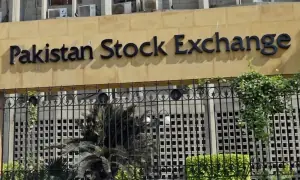KSE-100 plunges over 1,000 points, banking and auto sectors take a hit
2 min readThe stock market plunged in its first post-budget session, as the benchmark KSE-100 Index was down nearly 1,000 points in intra-day trading with investors gauging the impact of new budgetary measures imposed by the government.
At around 2:15pm, the KSE-100 was hovering around 41,006.75, a fall of 1,007.98 points or 2.4%.
On Friday, the KSE-100 index rose 278.77 points or 0.67% to close at 42,014.73 points in anticipation of the budget.
“Negative sentiment in the market has come due to budgetary measures announced by the government on Friday,” Sana Tawfik, vice-president research and a senior analyst at Arif Habib Limited (AHL), told Business Recorder.
The analyst said increase in taxes on the banking sector, an index heavyweight, is contributing to the slump. The auto sector, also hit by taxes, was also down during trading.
Post-budget press conference: Fiscal tightening on the cards
The federal government on Friday proposed to increase the tax rate for banking sector, i.e., from 39% to 45%, including Super Tax for the next fiscal year.
In his budget speech, Federal Minister for Finance Miftah Ismail said that the banking sector has earned windfall gains due to higher interest rates and risk-free investment in government securities. Therefore, in order to capture the real tax potential, the tax rate on banking companies is proposed to be enhanced to 45%.
“Banking sector profitability may decline by 19% due to these proposals,” said Tawfik.
“Furthermore, a spike in US inflation is negatively impacting equities across the globe, raising expectations of a Fed rate hike,” she said.
The US consumer prices hit a new four-decade high, rising 8.6% and topping what economists thought was the peak in March.
With Russia’s war on Ukraine continuing to pressure global fuel and food prices, and amid ongoing supply chain uncertainties due to Covid-19 lockdowns in Asia, experts now say the expected easing of inflationary pressures will take much longer to materialise.
Meanwhile, Tawfik expects the local markets to remain under pressure throughout the month of June amid upcoming developments from the IMF and Financial Action Task Force (FATF).
“Uncertainty to remain ahead unless positive news is received from the IMF and the FATF,” she said.
For the latest news, follow us on Twitter @Aaj_Urdu. We are also on Facebook, Instagram and YouTube.


























Comments are closed on this story.